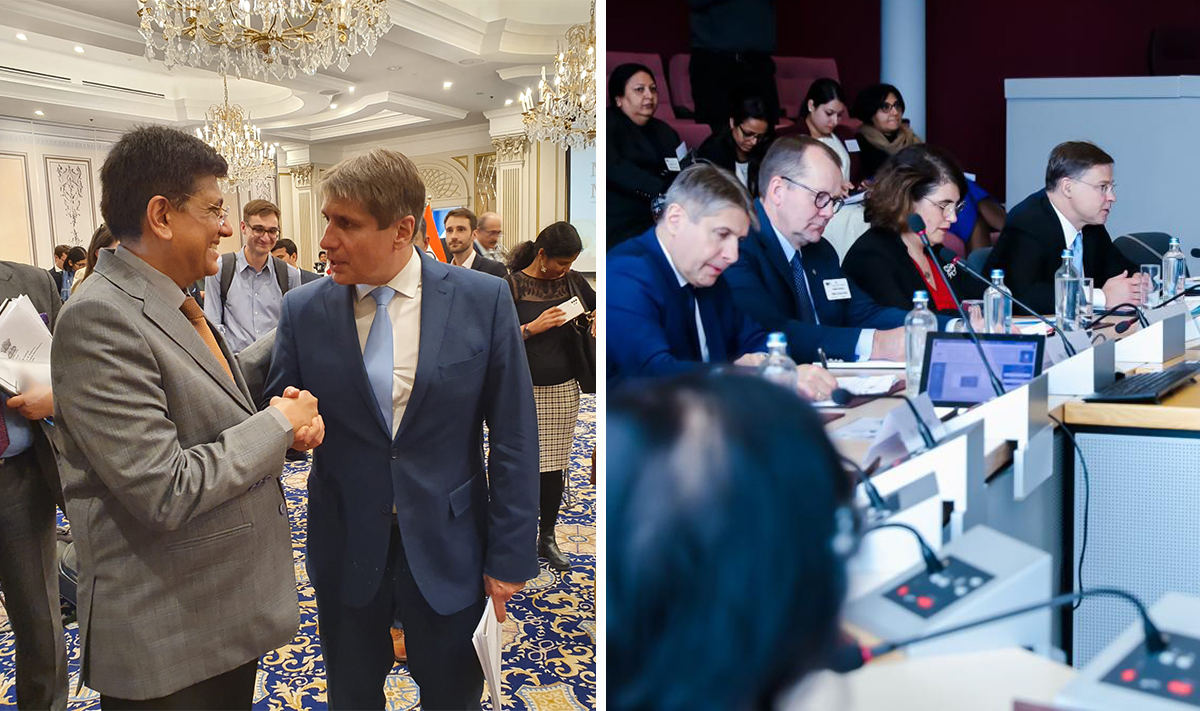BusinessEurope Headlines No. 2023-17
EU-India TTC and trade negotiations: need to maximise results in both workstreams

"The EU-India Trade and Technology Council (TTC) can help advance work on critical areas of mutual interest and consolidate the bilateral relationship. But we also need to deliver on the trade and investment negotiations with India", said BusinessEurope Director General Markus J. Beyrer at a stakeholders event in the context of the TTC on 15 May. Both the TTC and the bilateral trade and investment negotiations should remain as separate processes, he added. On the TTC, the main priorities for European businesses regarding WG3 on trade, investment and resilient supply chains are: a) anticipating and preventing disruptions in supply chains and building resilience; b) enhancing bilateral investment in the context of diversification needs; c) cooperating on investment screening by exchanging best practices; d) cooperating on multilateral trade issues notably the World Trade Organisation.
The event was co-chaired by the European Commission Executive Vice-President Valdis Dombrovskis and his Indian counterpart, Commerce and Industry Minister Shri Piyush Goyal. Six business representatives participated from each side.
Contact: Elena Suárez
How free-trade agreements support EU competitiveness
 Trade agreements can make a major contribution to European competitiveness by a) supporting the EU's de-risking strategy through diversification of imports and exports; b) contributing to the modernisation of trading rules in key areas like climate change and digitalisation; c) supporting the EU's engagement with countries around the world, making it a true global player. This is the main message stemming from the panel discussion organised on 12 May by the Women in Trade Network Brussels and BusinessEurope, with Sabine Weyand, Director General for Trade at the European Commission, and Luisa Santos, BusinessEurope Deputy Director General.
Trade agreements can make a major contribution to European competitiveness by a) supporting the EU's de-risking strategy through diversification of imports and exports; b) contributing to the modernisation of trading rules in key areas like climate change and digitalisation; c) supporting the EU's engagement with countries around the world, making it a true global player. This is the main message stemming from the panel discussion organised on 12 May by the Women in Trade Network Brussels and BusinessEurope, with Sabine Weyand, Director General for Trade at the European Commission, and Luisa Santos, BusinessEurope Deputy Director General.
Contact: Luisa Santos
Health and safety of European workers: it's key to address new and emerging trends
 Whilst a lot of work has already been done to improve the health and safety of European workers in the past decades, new and emerging trends – including climate change and mental health at work – will need to be addressed appropriately to ensure that the EU retains the highest competitive level of occupational safety and health in the world. This was one of the key messages conveyed by BusinessEurope Social Affairs Director Maxime Cerutti at the Occupational Safety and Health Stocktaking Summit, which took place in Stockholm on 15-16 May. Against this background, the need for better data gathering as well as the development of supportive guidelines and tools will be an essential first step in responding to these complex cross-cutting issues. It is furthermore important to underline the added value and crucial role of the tripartite Advisory Committee on Safety and Health at work (ACSH) in finding balanced solutions to these problems. BusinessEurope will continue contributing to implement the OSH Strategic Framework 2021-2027 effectively.
Whilst a lot of work has already been done to improve the health and safety of European workers in the past decades, new and emerging trends – including climate change and mental health at work – will need to be addressed appropriately to ensure that the EU retains the highest competitive level of occupational safety and health in the world. This was one of the key messages conveyed by BusinessEurope Social Affairs Director Maxime Cerutti at the Occupational Safety and Health Stocktaking Summit, which took place in Stockholm on 15-16 May. Against this background, the need for better data gathering as well as the development of supportive guidelines and tools will be an essential first step in responding to these complex cross-cutting issues. It is furthermore important to underline the added value and crucial role of the tripartite Advisory Committee on Safety and Health at work (ACSH) in finding balanced solutions to these problems. BusinessEurope will continue contributing to implement the OSH Strategic Framework 2021-2027 effectively.
Contact: Isaline Ossieur
Urgent need to reduce inactivity rates
 Activating the inactive can be one of the most effective options to tap into the human potential so badly needed by European employers. This a key message from our policy orientation note on reducing inactivity rates in Europe, published on 8 May. The inactive are not a homogeneous group, and understanding the obstacles in taking up employment is crucial for effectiveness of the proposed solutions. Some of the necessary measures are universal and apply to all sub-categories of the inactive. They include adopting dedicated outreach activities and tailor-made selection and recruitment processes, improving effectiveness of matching between jobs on offer and those coming out of inactivity spell, and cooperation of different stakeholders.
Activating the inactive can be one of the most effective options to tap into the human potential so badly needed by European employers. This a key message from our policy orientation note on reducing inactivity rates in Europe, published on 8 May. The inactive are not a homogeneous group, and understanding the obstacles in taking up employment is crucial for effectiveness of the proposed solutions. Some of the necessary measures are universal and apply to all sub-categories of the inactive. They include adopting dedicated outreach activities and tailor-made selection and recruitment processes, improving effectiveness of matching between jobs on offer and those coming out of inactivity spell, and cooperation of different stakeholders.
A more individual approach will depend on individual reasons for the inactivity: for example, young parents with childcare responsibilities are in need of an affordable and good-quality childcare provision, people with low/obsolete skills will need dedicated re- and upskilling provisions, and for those with long unemployment history, the pre-training activities that prepare them for further professional training. Another challenge in designing effective solutions is the fact that barriers to enter the labour market often interact, so the solutions must be multi-faceted.
The private sector can go a long way, but a dedicated public sector support is often needed. The inactive are not a usual target group for public employment services. However, developing the offer to support the activation of the inactive groups is urgently needed. Social services, either public or provided by non-governmental organisations, are an essential preliminary stage to prepare the inactive for further activation measures. Unfortunately, quite often they lack connection with the labour market and do not result in a desired labour market outcome (taking up and remaining in employment). Member States should also actively work with, and foster stronger cooperation between public and private employment services in the provision of training to inactive people that responds to labour market needs.
There is also room for making-work-pay policies, economic activity-friendly legislation, access to diverse contractual arrangements and striking the right balance between a temporary conditional support and income from work (the latter should be higher than income from benefits). BusinessEurope would welcome it if the European Commission supported the European Network of Public Employment Services in improving its cooperation with private employment services across Europe, as well as between employment services and social services, with a view to reducing inactivity rates and progressing towards the EU and national employment rate targets set as part of the European Pillar of Social Rights Action Plan. National specificities and practices should be always taken into account while proposing potential actions.
Contact: Anna Kwiatkiewicz
Electricity market design: step in the right direction but challenges not fully addressed
 EU companies are facing the prospect of long-term energy price rises well above major competitors. Wholesale gas prices in Europe are not expected to come down to pre-covid levels until 2026/2027. If the cost differential is not addressed, aside from the industrial curtailments and shut-downs already observed, it will have serious consequences for the long-standing competitiveness of European companies and EU’s global strength.
EU companies are facing the prospect of long-term energy price rises well above major competitors. Wholesale gas prices in Europe are not expected to come down to pre-covid levels until 2026/2027. If the cost differential is not addressed, aside from the industrial curtailments and shut-downs already observed, it will have serious consequences for the long-standing competitiveness of European companies and EU’s global strength.
The European Commission’s legislative proposal to reform the EU electricity market rules is a step in the right direction. Europe needs a future-proof electricity market with clear long-term signals for the investments that will be needed to reach the ambitious European climate targets and at the same time guarantee security of supply. Still, the proposal does not fully address the challenges faced by many industrial consumers.
The focus of the legislative proposal on supporting long-term contracting would allow for more hedging opportunities for companies and help reduce the influence of gas price swings on consumer prices. Power purchase agreements (PPAs) can contribute to both decreasing the price volatility for consumers and ensuring that consumers purchase energy with profiles suitable to their needs. They can also play a key role in financing new renewable energy investments.
Contracts-for-difference (CfDs) could also serve an important role in ensuring sufficient investments for decarbonised generation, however they should remain voluntary in nature and provide industrial consumers with access to the benefits of these instruments such as through the redistribution of revenues.
Read our comments and amendments on the Electricity market design.
![]() Contact: Agata Zalewska
Contact: Agata Zalewska
NZIA: limited scope risks becoming handicap for Europe’s transformation
 “This is an important first step, which should be followed up with a broader prioritisation of competitiveness in European policy-making to stimulate the investments required to transition the entire economy towards net zero”, BusinessEurope stated in its comment on the Net-Zero Industry Act. Simpler and faster permit-granting processes are a basis to attract more investments in Europe in key technologies for a successful decarbonisation. However, in its current form, the Act is too modest to truly achieve the objective of accelerating the transformation to net-zero industry. The EU must acknowledge that the decarbonisation of Europe is a matter of priority for the whole economy, industries and businesses and their complete value chains. The limited scope of the Act risks becoming a handicap for Europe’s net-zero transformation. It is also vital to have a structured public-private dialogue at EU level to achieve a successful implementation of the Net-Zero Industry Act.
“This is an important first step, which should be followed up with a broader prioritisation of competitiveness in European policy-making to stimulate the investments required to transition the entire economy towards net zero”, BusinessEurope stated in its comment on the Net-Zero Industry Act. Simpler and faster permit-granting processes are a basis to attract more investments in Europe in key technologies for a successful decarbonisation. However, in its current form, the Act is too modest to truly achieve the objective of accelerating the transformation to net-zero industry. The EU must acknowledge that the decarbonisation of Europe is a matter of priority for the whole economy, industries and businesses and their complete value chains. The limited scope of the Act risks becoming a handicap for Europe’s net-zero transformation. It is also vital to have a structured public-private dialogue at EU level to achieve a successful implementation of the Net-Zero Industry Act.
![]() Contact: Albane Suaudeau
Contact: Albane Suaudeau
Calendar 
- 19-21 May: G7 Hiroshima 2023
- 31 May: Fifth Annual Conference on Regulatory Scrutiny in the EU
- 6 June: Reuters Event: Responsible Business Europe 2023
- 14-15 June: International IP Enforcement Summit
- 19-20 June: TDI23 – Day of Industry
Not yet a subscriber? Register here.
Reminder: please have a look at our privacy policy